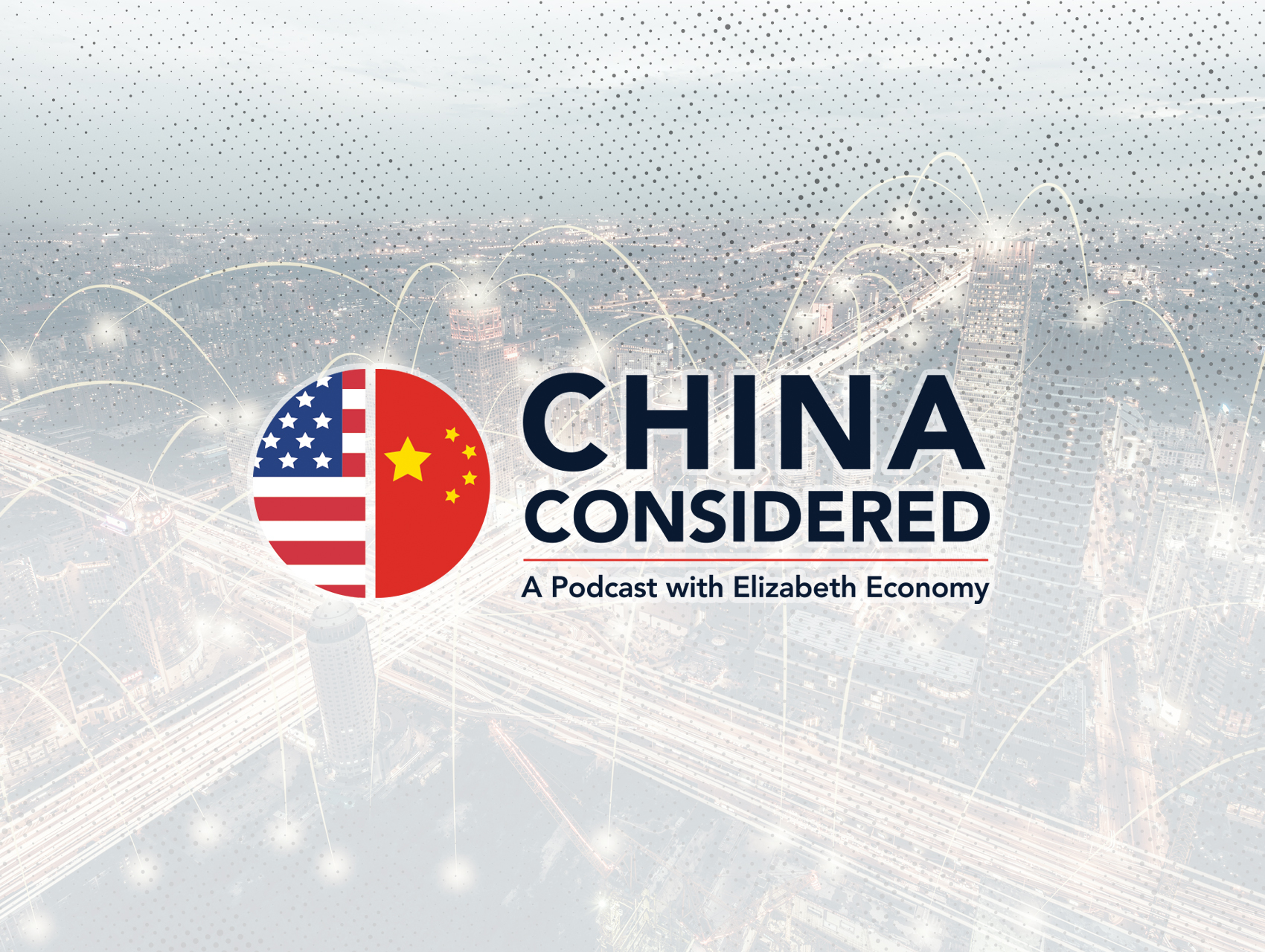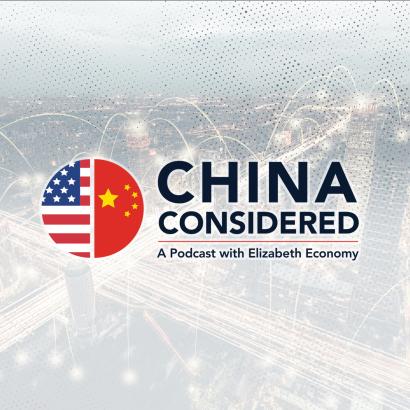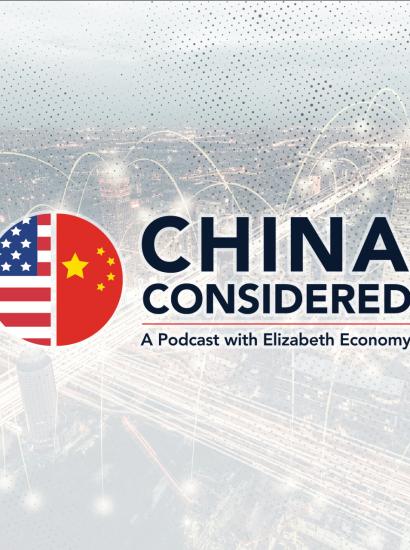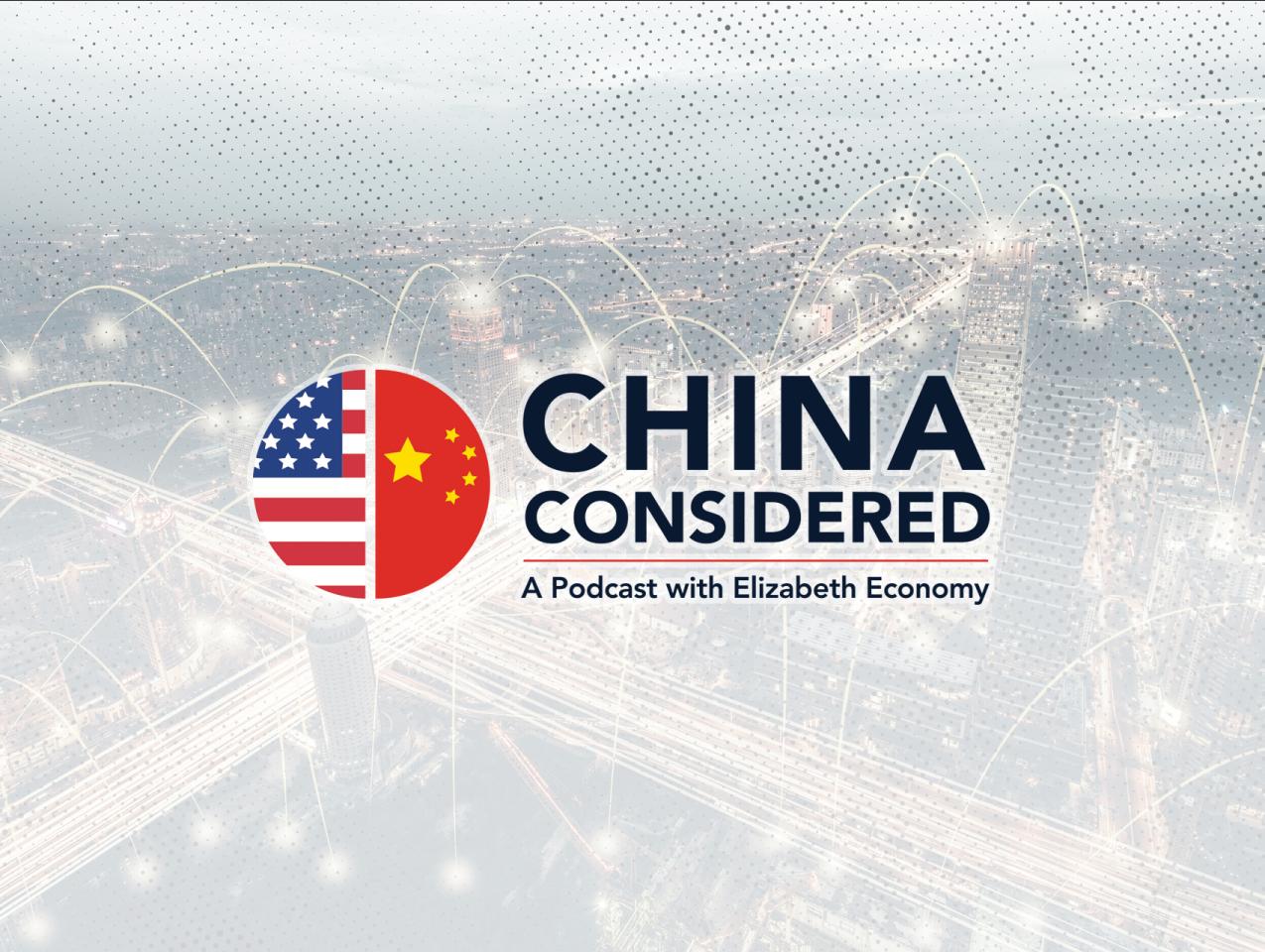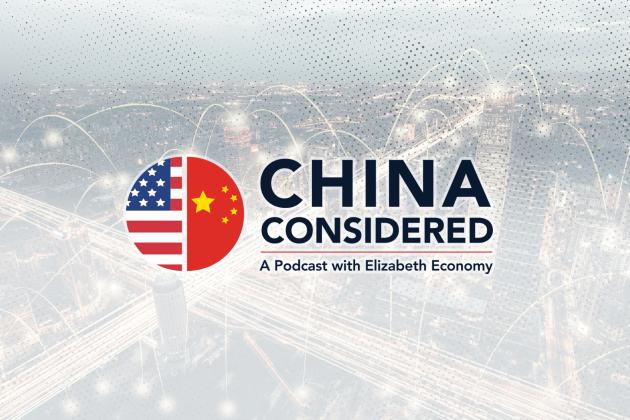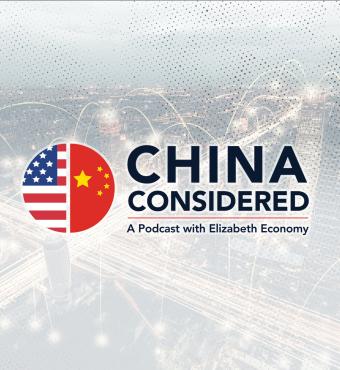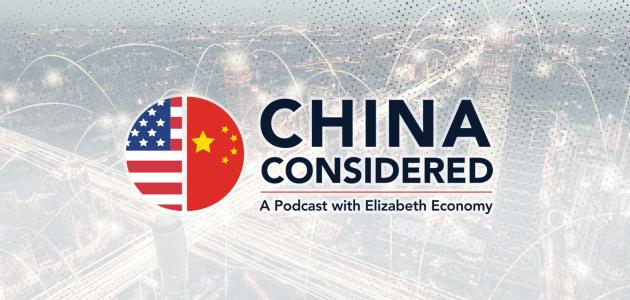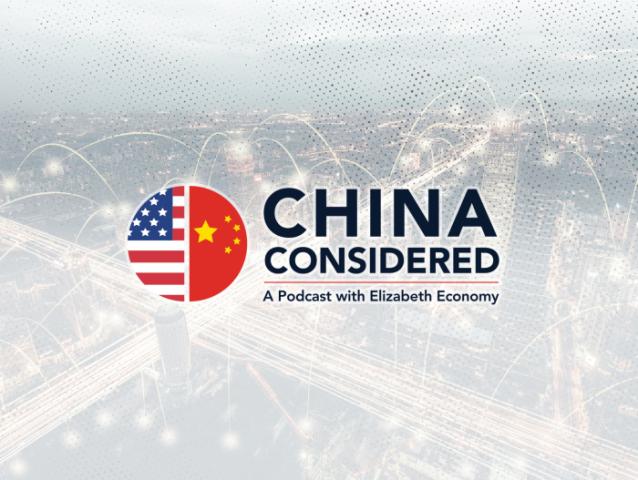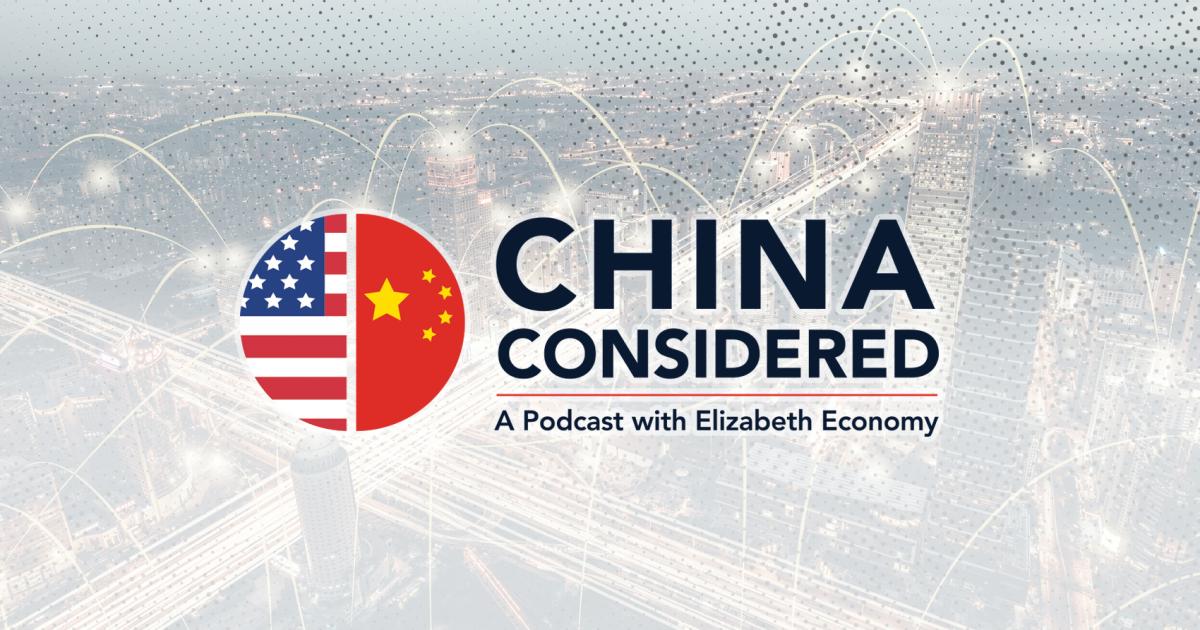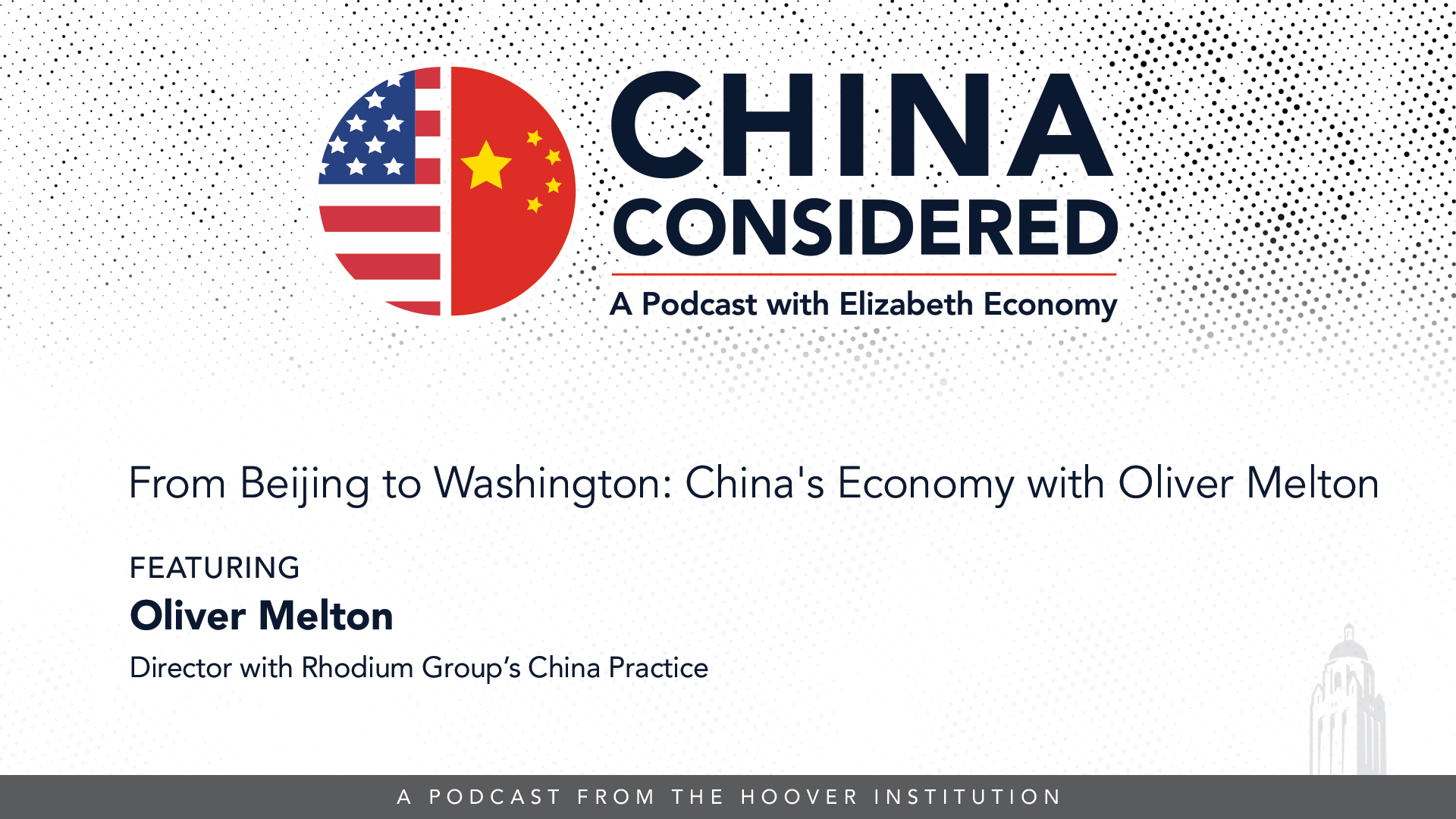- China
- Economics
- Confronting and Competing with China
Host Dr. Elizabeth Economy interviews Oliver Melton, who shares insider perspectives on China's complex economy, drawing from his years as a diplomat in Beijing and his current role at the Rhodium Group. Economy and Melton discuss how China's structural imbalances, high savings rates, and over-investment in real estate have created fundamental economic challenges that the leadership struggles to address through consumption-boosting policies. Melton also evaluates three major Chinese initiatives: the Belt and Road's evolution from sprawling campaign to targeted strategic investments, Made in China 2025's mixed success, and China's approach to de-dollarization focused on sanctions-proofing. The two also touch on the difficulties of US-China economic diplomacy and that any effective response to China's industrial policies requires coordinated action among the US, Europe, Japan, and other allies rather than unilateral American measures.
Recorded on September 11, 2025.
>> Elizabeth Economy: Welcome to China Considered, a podcast that brings fresh insight and informed discussion to one of the most consequential issues of our time, how China's changing and changing the world. I'm Liz Economy Hargrove Senior Fellow and co-director of the program on the U.S. china and the World at the Hoover Institution at Stanford University.
Today, we're going to return to one of those fascinating but often vexing issues that we all confront when we're thinking and working on China, namely, what's going on with the Chinese economy. The stock market is up, exports are up, but the property sector still seems to be a drag, and consumption is still low.
Fortunately, we have with us today Oliver Melton. Oliver just returned from five years as the Treasury Department's financial attache in Beijing. He's now the director of Rhodium Group, an economics consulting and research organization. Welcome, Oliver.
>> Oliver Melton: Hey, Liz. It's really great to be here.
>> Elizabeth Economy: Really great to have you.
All right, and I should say, I guess, welcome back to the United States after five years in Beijing. How does it feel to be back?
>> Oliver Melton: It's really, really nice to be back. And coming back to D.C. is always really great because it's so green and small compared to Beijing.
>> Elizabeth Economy: Anything you miss, anything you miss about.
>> Oliver Melton: China right now, the food is going to be really hard to do without. We need to really improve that in the US, I think.
>> Elizabeth Economy: Improve the Chinese food, or just in genera,l the Chinese food.
>> Oliver Melton: The Chinese food we're really lacking here.
>> Elizabeth Economy: Okay. All right, so let's get started. We're going to focus on the Chinese economy, but let's start with what it was like to be the Treasury's financial attache for five years in Beijing. What did, what does that even mean? What did you do on a daily basis?
>> Oliver Melton: Yeah, so no day was really the same. I spent probably about half my time being Treasury's sort of chief analyst in the field. So my job was to go around and talk to really smart people about what was happening in the economy, what we thought the policy direction was, what the leadership was thinking.
So that could involve talking to economists, that could involve traveling around, talking to real estate developers. Really, just about anything. That was a lot of fun. And you had to be resourceful and try to find people who'd have interesting insights into an absolutely massive, ever changing and complicated economy.
And then the second half of my job was to be a diplomat, right? It was to facilitate communication between the Treasury Department, Secretary Yellen and her team, primarily, but then Secretary Bessen with Chinese leadership. And so that would involve Negotiations, it would involve a lot of planning for the contacts that we had, the engagements we had, and a degree of advice back to headquarters about what I thought the Chinese were thinking or how I thought that they would respond, or why they were acting in a certain way.
>> Elizabeth Economy: Great. I want to come back to the negotiation side of it and, and, you know, hear something from you about what it was like to sit in those negotiations and your impressions of, of the US and the Chinese and how they negotiated. But let's just focus a little bit in on, you know, what you thought about the Chinese economy and whether what you were seeing, you know, being on the ground there, you know, did it differ a lot from what you might read in the Western press?
Did you think this is so radically not how I understand the Chinese economy, or did what you were seeing, roughly speaking, dovetail with what we might be getting back here in the U.S. you.
>> Oliver Melton: Know, both probably, is the answer. So, you know, living in Beijing, you're not really living in the Chinese economy, right?
You're living in this very different, this very sort of isolated, niche component of the Chinese economy. It's a capital city, so it's a little bit more resistant to the fluctuations in the rest of the economy. It's much more service sector oriented than the vast majority of the economy.
And so you really had to get out of Beijing to get any sort of sense of what the rest of the economy was like, what the majority of the economy was like. And even then, China is incredibly diversified, Right. It's as big and complex as Europe. And so talking about what the Chinese economy is like is as nonsensical as talking about, like, what Romania is like in, in the context of London.
Right. And these are just two fun. It's just an enormous and varied economy, and parts of it can be doing really badly and parts of it can be doing pretty well. And that, that was certainly happening when I was there. So I would say that we always struggled getting a sense of what real growth was.
Right now I'm at the Rhodium Group and my colleague down the hall, Logan Wright, has done a lot of forensic data analysis, the kind of stuff that we certainly did a lot of inside the Treasury Department to get a sense of what we really thought was happening. But the hardest part of the job, and maybe even arguably the most important, was to try to figure out what was coming next, what the policy direction was for the leadership.
And that was very difficult, the Chinese have gotten stricter and stricter under the current leadership, but even in the last few years, they've gotten much more aggressive with information controls and censorship and sort of oversight, you could say nicely, of who says what to your friendly foreign diplomats.
And so it's difficult to get an honest assessment of what the leadership recognizes to be weaknesses or shortcomings in the policy strategy. So we really all had to become experts in how the Communist Party communicates to itself, right? So I had a large stack of people's dailies on my.
On my desk. We spent a lot of time reading Xi Jinping speeches and other leadership speeches to try to understand what the intellectual framework was for their policy strategy and then also the institution. So you can't skimp on understanding how China is structured. There's a very strong leader at the top, but the institutions really still matter quite a bit.
And you have to understand what they control, what they're trying to achieve and how they're structured if you want to understand how policy evolves in that system. So there's a lot of kind of Kremlinology in my job and a lot of going around trying to, you know, talk to people about what they were seeing as well.
>> Elizabeth Economy: So did you see a vast gap between, you know, what you were reading in the People's Daily or in Xi Jinping speeches and what you would see on the ground? Or was it really a function of. Here, Xi Jinping announces something like made in China 2025. And then you go out and, how much of the country did you actually see?
How many provinces did you visit actually? But you go out and you look and you see, actually, I am seeing. These policies translate very directly into change on the ground.
>> Oliver Melton: How many provinces do we go to? You know, we know we haven't counted, l really.
>> Elizabeth Economy: You do keep track of how many provinces you went to?
>> Oliver Melton: Okay, I think, to be honest, in one meeting, one very, very boring meeting, I think I listed all the places I'd been, but I don't have that in front of me. But we went to the majority of provinces and we made a real point as a family and also as a diplomat trying to go to a diverse set of regions in China to see places that were heavily industrial, hyper modern, like Shanghai or Shenzhen, and fairly rural and so forth.
And yeah, you do see, you do see transmission quickly, but it doesn't work always. Right. It's a normal country where they try things and it doesn't always happen. It doesn't always work. And so real estate is probably the best example of that, where no issue could have been closer to the center or closer to the leadership's attention in the economy.
And some of the things they did were incredibly effective, right? So when they decided to cut off real estate finance for highly speculative investments, they were hyper successful, arguably way too successful, and developers of all stripes hyper over leveraged. Pretty healthy developers. Nobody could get finance anymore. And the industry came to a grinding halt.
And they basically engineered, on purpose or by accident, a total collapse in the sector. And then when they decided to kind of try to turn that back on several years later, not, not to reflate the property sector, but to restore finance to healthy developers, or at least healthy projects, they really struggled to do that.
And so there was a lot of effort, there was a lot of motion in the system, but they didn't impose the right kinds of guarantees. They didn't line up the incentive structure with the economic institutions. And so nothing really happened at first. So you had a lot of action, a lot of activity, a lot of talking, and that worked, but you didn't have a lot of financing going out the door.
>> Elizabeth Economy: So give us the time frame here. When are we talking about?
>> Oliver Melton: I think 20. I think we're at this point, 2020, late 2023, early 2024. There were two rounds of trying to restore finance to the whitelisted projects. This is when the cities started to have whitelists for the projects that should receive financing for completions.
And it didn't work because the banks are smart enough to know that if they lose all their money on a project, the government's going to come after them in the future, or they're going to. I mean, frankly, they're just going to lose the money and they're going to have to deal with that.
And so, you know, the Communist Party has an enormous amount of authority over certain types of decisions, but they can't just will economic activity if it's against their interest. And so they really can be successful sometimes and they can fail in other times.
>> Elizabeth Economy: So the banks were not confident that the Chinese Communist Party would recapitalize them, is what you're saying.
Right, which they've done in the past.
>> Oliver Melton: Yeah, they weren't confident that they would get recapitalized, and they initially weren't even confident, it seems they weren't even confident that they wouldn't be held responsible for loans that went bad. There's sort of two layers in the banking system. One is the, you know, your profits and losses, which can be managed rationally.
You can take more risks and get more profits, and the banks can kind of handle that. But then there's also the. The corruption side of it. And bankers are often investigated for corruption if they lose money on an investment or on a loan. And so there's a huge amount of conservatism in the banking system and frankly, in the investment community.
Because if you lose the state's money, it can suggest corruption even when it was actually a good business decision. And so when the, when the government came along and said, hey, we want you to lend to these loss making or near loss making property developments so that they can complete the houses, banks were correctly or rationally wary to do so.
And then they came along and then the party had to promise a year later and said, okay, look, we won't investigate you for corruption if you lose money on these deals. And that was sort of a prerequisite for things to go forward. But it still hasn't turned back on.
>> Elizabeth Economy: Right. I was just going to say that the property sector still hasn't really rebounded though. Right. Maybe less of a drag, but still a drag on economic growth.
>> Oliver Melton: Yeah, and nor will it. And, and for their, you know, in their defense, they were not trying to reflate the property sector.
They were trying to just get the half finished apartments, complete ones that had already been sold to folks.
>> Elizabeth Economy: So take the property sector and fit it into sort of the overall, as you mentioned, very complex, complicated Chinese economy. So that's a little bit of a drag. But where, where else is the Chinese economy having trouble?
Where is it, you know, doing well? And how do you see all these pieces fitting together? I guess what is your model in your own head of how the Chinese economy works?
>> Oliver Melton: Maybe a simple version would be better that basically China, as everyone knows, has a, an economy that's, that has a really high savings rate.
Right. So too much of national income is saved by your households or the government. And as a result that money needs to be invested or China needs to run a really large surplus for the rest of the world. In the early two, in the mid-2000s, they ran a huge surplus, you know, 10, 10, 10% or greater current account surplus.
And a lot of that savings was then absorbed in this massive investment boom in the 2010-2017, 2018 period. First with infrastructure and then with real estate. And so real estate, the way I think of this is that real estate was a non tradable, somewhat productive investment target that allowed China to get for about, you know, five or six or seven years to allowed them to extend this imbalanced model, right?
So super high savings rate doesn't have a huge current account surplus because they're investing this money domestically. But you can only build so many houses and so many, so many new cities or so many railways before, before you run out of places to build. And so they, they definitely reached that point where they had more Stuff than they needed more, more apartments and than they need.
And that came, that came crashing down really quickly partly because of policy decisions, but partly just because of the kind of the physics of it. They had enough houses at this point and so now we're kind of back where we started, which is you have an imbalanced economy and you either need to significantly increase consumption or you're going to return to really significant trade surpluses.
And so right now, I think, you know, for the last few years you've seen the government kind of trying to feel its way through this problem, on the one hand, trying to find new destinations for investment. So if real estate wasn't going to absorb all this investment, maybe advanced manufacturing would maybe new, you know, maybe electric vehicles, maybe robotics, other sectors.
And that's what the last administration was particularly nervous about, was that this kind of massive tidal wave of, of investment cash could be, could be channeled away from real estate into these sectors and create really significant disruptions for the rest of the world. And indeed we started to see that.
And on the other hand, you see the government trying to boost consumption so saving less. But they're not really exploring the kinds of policies or they're not really pursuing the kind of policies you would need to have a fundamental shift in the overall level of savings in the economy.
So I see real estate as a drag on the economy, but also sort of the elimination of sort of a temporary band aid or a temporary, sort of a transitional or a temporary fix to a structural problem that's been around for 20 years that now is really coming to a head.
>> Elizabeth Economy: Right. So you mentioned that the Chinese government is not undertaking the types of policies that it needs to, to boost consumption. And certainly we've heard a lot about this and we know that they've done these trade in programs for, you know, goods and even for cars in some places.
I guess they've, you know, increased salaries in some areas for civil servants or for teachers at some, in some places. So there have been some moves. But what, what would you be looking for when you say the policies that they need to undertake? What would be sort of your set of two or three things if they started to make moves in those areas, you'd be like, check, check, check.
They're getting it right.
>> Oliver Melton: Yeah, I mean. Well, Rhodium has a whole paper on this that, that was published recently that we can link to. But I would say probably the same thing that the World bank and the IMF have been saying. And honestly, frankly, a huge number of Chinese economists have said publicly or privately.
The first is you need a much more comprehensive social safety net. You need government transfers basically to households in the form of pensions and social welfare or social insurance programs, healthcare in particular, healthcare spending, and the quality has improved significantly over the last 10 years and. People might not appreciate that.
Liz, I'm sure you've been to a Chinese hospital or a doctor 20 years ago or five years ago and there's a massive difference.
>> Elizabeth Economy: Yeah, no, I haven't been, but my daughter spent several days at a Chinese hospital with an ulcer. I don't think it was a great.
Experience, but I'm sorry, sorry to hear that.
>> Oliver Melton: But it would have been worse 20 years ago, I guess, but-
>> Elizabeth Economy: No doubt.
>> Oliver Melton: So there's, there has been progress, but there needs to be just massively more progress, right? Because Chinese families still social self insurers, they keep a pretty significant amount of their income and savings just in case something goes wrong.
And the state has the power to reduce that precautionary savings through greater investment in social services. One of the biggest areas is definitely the share of the state in the economy. So a little bit of a complex argument, but basically the problem is, is that the state controls a pretty significant amount of corporate revenue or corporate profits in the economy and is prone to reinvest those profits, sometimes in the, in the same business, sometimes in other businesses or other government controlled ventures, including government vc, which is kind of new.
But it doesn't ever get to a point where it says, you know what, my rate of return on this project is only 2%, I'm going to consume this, right? And if you're a household and you, your investments reach a level, a rate of return that's too low, you'll consume it, right?
You'll make a rational decision about deferred consumption or consumption today. And so you stop investing when it's no longer profitable to invest and you can kind of enjoy the fruits of your labor today. And that doesn't happen in the Chinese system, right? The state profits are kind of insensitive to intertemporal substitution.
So they just keep investing and keep investing and that needs to change. And that can happen either through transfers or through greater privatization or private ownership of state assets. So that's a big one and really, really hard to see. I think the number one thing though that we would like to see, that I would like to see is more ambition for household income as a share of GDP.
I think 10 years ago this was in the five year plan and in some of the party documents and certainly in the, in the work reports that the, that the state was actively pursuing higher wage growth than GDP growth. And now, and for the last maybe five or six years at least, the, the target has been household income should grow in line with gdp, which means that the party is not trying to see its people get richer faster.
And if people don't have a higher and higher share of national income, there's a ceiling on how fast consumption should grow. And as a corollary, Larry, to that, they used to promote the service sector. They used to think that the service sector white collar jobs, you know, the kind of jobs that dominate, I mean to completely dominate the US Economy, have a much higher wage share of output.
You know, the, the amount of revenue that then goes into household bank accounts is much higher than for factories. And I would be encouraged to see the, the party kind of reduce its focus on manufacturing and the production of physical stuff and you know, the building of factories and more human centric jobs to, to raise wages as well.
>> Elizabeth Economy: That's a really interesting point that I actually have not heard made before. You know, one of the things that, that I've been thinking about or I have thought about is just the really slow rate of growth in per capita GDP in rural sector over the past several years.
I actually, you know, Common Prosperity, for whatever that was worth, I think was targeted at the, you know, absolute most impoverished in the country. But I mean, this is still a country with, you know, 600 million people living on a couple of $100 a month. And I've really been surprised at how little attention seems to be being paid to this, you know, very significant part of the Chinese population and their sort of consumption ability and also just their ability to participate in the 21st century economy because I don't even see that the government is doing much to train them up for this, you know, incredible sort of technological, you know, revolution that's underway in much of the rest of the country.
>> Oliver Melton: Yeah, and your, your colleague Scott Rosel has done some of the best work in the world on this to highlight not just the, the severity of the, the wealth gap between rural areas and urban areas, but also the fact that the HUCO system actively prevents workers from bringing their children into urban environments.
And because of the, the gap in education quality is really leaving behind millions of children in ways that are a human tragedy, but also really counterproductive to China's long term growth. So it's a, it's a mystery to me as well. It's, it's, there's, there's really just no fundamental, there's no compelling reason to do this other than just sort of a failure to address basic fiscal transfer issues.
And you're right that with Common Prosperity they talked it up. It was on the front page of the People's Daily. I very Very, very wrongly predicted to my headquarters that if you put something on the front page of the People's Daily, it means you're going to follow up with it, follow up with real dollars.
And they, they just didn't do it. They just didn't follow up with actual fiscal transfers of the magnitude that would really make a huge difference. There was, there were some, usually city to county, but we just didn't see the scale needed to make a, a really fundamental difference.
>> Elizabeth Economy: No. And there's a great book by Steve Tsung and Olivia Chung that looks at, you know, what Xi Jinping has said, you know, are the priorities. And then actually if you track how policy was implemented, what really is a priority and common prosperity, you know, didn't, didn't make it onto the list of, of actual priorities for Xi Jinping.
So follow through was actually not terribly robust. So let's pivot a little bit. You know, one of the things about China is that they often, you know, Chinese leadership is prone to have massive campaigns of one sort or another. And I want to just get your take on where you think three of them sort of stand.
How successful has, you know, the leadership been in pushing forward with them? What do you see as the sort of up and down sides of each? And they're the Belt and Road Initiative made in China 2025 and de dollarizing the global economy. So let's just start with the Belt and Road Initiative because this is one where you may be aware, since you were just in the U.S. government, that there lot of chatter in Washington that the Belt and Road Initiative had kind of failed, that it was over.
Beijing didn't have the resources to push forward with it. That wasn't a position that I subscribe to. But I'm curious, what's your take on where the Belt and Road stands today?
>> Oliver Melton: Yeah, so I think it's, it's fair to say that the criticism is right and wrong at the same time.
Right. So most definitely it had the characteristics of a campaign. Right. You know, they said go forth, you know, 2013, 2014, everybody go out, everybody do this. All the banks are authorized to lend, take your forex and use it for something abroad. And everybody did it. It was kind of kids soccer with everybody chasing the ball and.
Then lo and behold, about three or four years later, right, as the first repayments were scheduled from these projects, they started to figure out pretty quickly that a lot of them weren't going to make money, right? The political risks in Africa and Latin America and Central Asia that had depressed in foreign investment before China showed up were in fact applicable to Chinese firms as well.
And you had a whole lot of, you know, spectacular failures, moderate failures, delays, etc. You also had a huge amount of corruption, right? There it is, there's still a massive trail of corruption investigations that are chasing some of these deals. Some of them are kind of lower, lower in the headlines.
But there's a long hangover from this period in, in China. And they got burned, right? And we saw pretty quickly that these firms and financial institutions pulled back, got a whole lot more conservative. The better firms were able to keep investing or keep lending, but the sort of cowboy firms or the folks that weren't particularly good at learning from mistakes pulled back and a lot.
So from that perspective, you could say, yeah, it was probably overly ambitious, even you could say something worse than that. And they got burned and it was predictable and look how funny that was. On the other hand, they achieved a lot of their strategic objectives. So buried within the sort of general rush of, you know, thousands and thousands of companies going abroad were a number of very carefully orchestrated and targeted investments and projects that fulfilled strategic objectives.
You know, ports that could be dual use, that are dual use, vertical control over minerals and processing of, of minerals that are really crucial for modern industry. I mean, you know, at the time we were all reading the, you know, we were reading the plants, these were public.
They, they were not concealing what they were doing, going after minerals that I had to look up first, you know, first in Chinese and then in English to see what they were doing. And, and we knew they were going after this. But the scale and the fact that these resources would be so integral in things like batteries wasn't as apparent back then.
But even then, you know, they had foresight and they, they may have lost some money on some of these deals and they may have overpaid, they may have invested kind of too prematurely or at the wrong point in the cycle, but they did pretty well. And so I think the, the ultimate evaluation of the Belt and Road initiative really depends on what your perspective is.
And my guess is that Beijing would say, okay, we made some mistakes, we learned a lot of lessons, but we achieved a huge percentage of our goals. And as we go for round two or round three we'll be smarter, we'll be more targeted. We'll be a little bit more market disciplined in the sense that we won't lose as much money, but we're still going to be able to pursue our strategic objectives carefully.
>> Elizabeth Economy: Yeah, I mean, from my perspective, you know, I think looking at the, you know, point at which Xi Jinping seemed to take a step back and talk about small is beautiful and there seemed to be a little bit of a retrenchment. Actually what they did was they just got small, smarter and more efficient and, and more targeted.
And so the real push now is, you know, in the clean tech space. You know, it's in the digital space. And it still, I think, is in minerals and mining and then some infrastructure projects that are, you know, very carefully chosen. So you know, I think, you know, Washington and other places should be more concerned as opposed to less concerned because I think the Chinese have learned that and they don't want to build palaces and soccer stadiums anymore or big white elephant infrastructure projects.
They're really focused on what their strategic needs are and I think in extending their sort of infrastructure globally in these extremely core areas for example of Digital Stack, right? The Digital Silk Road and Cleantech. So I think the alarm bells should be going off more in Washington if we're thinking about competition space as opposed to less.
And in that same vein, of course, made in China 2025 and there have been some good studies that have come out by Merix, for example, maybe Rhodium has done some work in this area as well of evaluating how well made in China 2025 has actually done. And this of course was, you know, the big plan, you know, around 10 critical cutting edge areas of technology where China, China wanted Chinese companies to dominate in the manufacturer up to certain percentages, 70, 80, 90% would be controlled by Chinese companies.
And then of course, you know, China, these companies would become global champions. So you know, new materials, semiconductors, AI. How do you see it? I see it as a success. But what do you, what do you think?
>> Oliver Melton: Yeah, yeah, so Rhodium did do a study a little while ago and Merrick did a really good study as well, evaluating their success relative to different metrics.
And I think they key is to look at the different, different competing goals that they had. So on the one hand was the sort of loftier, more ambitious goal of dominating certain sectors or being a world leader in certain sectors. But the core goal was to eliminate dependence and vulnerability on foreigners and particularly the United States in, in these technologies.
Right. So it's, you know, offensive goal is to be dominant defensive goal is to just eliminate the U.S. u.S. Ability to sort of choke China, which is a vocabulary they use quite often. And in several sectors they did a really good job, right? They, and, and you know, in a few sectors they achieved their maximum goal.
Right? EVs are just unambiguously world leading and incredibly good. And they've done really well with clean, clean energy as well. I should also say that, that Xi Jinping himself has also said that they wanted to choose a select number of, of technologies where they would make the rest of the world dependent on China.
And they have absolutely done that for the purpose of deriving political leverage. And they have succeeded in that as well. So I'd say on their security goals they've done pretty well. There's still obviously several choke points in, in the economy where they remain dependent on foreign producers, but in some of those sectors like aviation, they have secondary suppliers.
And so it's not a total concentration on the United States, but as we've seen in recent months, they've, they have also developed countermeasures. Right? So their dominance of things like rare earths and, and even more than the rare earths, the higher value added manufacturing of intermediate inputs like magnets and motors have really given them leverage over the global economy.
That has been used fairly effectively to neutralize the US Dominance of semiconductors in this case. So I would say, I would say that they're, they're pretty confident. The other thing that Made in China did was it wasn't just, it wasn't just the ambition and the industries that Made in China pioneered.
It was also the way in which they were willing to work with commercial firms or, or private or semi private firms to commercialize technologies. Right. So they recognized that it wasn't sufficient to have, you know, a state lab or a state owned enterprise developed a technology. You had to be able to make it at a competitive price and it had to be designed for a consumer market.
And so they used made in China 25 in that period to experiment with different approaches to industrial policy where they would help private firms. Invest and develop capabilities. But they would do it in a way that maximized competition within that sector to improve the efficiency of resource allocation, but also the quality of products.
And they would also basically draw out the input output tables of an entire sector and make sure that there weren't any choke points. Right. So they didn't just go after evs, they went after batteries. And they didn't just go after batteries, they went after the minerals. And they literally had input output tables that could take up your whole wall.
And they made sure that in every single sector the banks and the local governments were, were helping, helping companies along to ensure that they could produce at scale and at quality the individual inputs that they needed. And most importantly, again, that there were enough of those firms that they could compete like crazy to ensure that they didn't just kind of sort of extract rents from the sector or perform badly.
And they look back at this experience and they, they recognize that they produced over capacity. They over invested in a lot of sectors. There's a lot of boom bust cycles where companies do really great work but then they can't make any money because the state encouraged too many entrants and frankly prevents bad firms from going out of business.
But by and large they, they think they did a hell of a job. And so they know that they need to tweak their toolkit. They need to, you know, they, Maybe they wanted 30 EV companies. They didn't need 130.
>> Elizabeth Economy: I think they had over 200 at one point.
So no, it was, it was, yeah, right, but this idea of involution, right, I think is a, a big issue now that you're talking about.
>> Oliver Melton: Yeah, but I think that they think they've got the recipe for success. They know that, you know, in round two, around three, they're gonna, I think they think they're gonna be able to build off their successes and they're gonna be able to, they're going to be able to do this more efficiently with less disruption and they're going to be able to do it across a much broader range of industries.
And I'll just say, sorry to go on for so long, but tying into the belt and road, you're seeing Chinese firms go global in a way that they hadn't before, partly because of slowing domestic growth, partly because of trade frictions, but also partly because Chinese firms have reached a level of sophistication and product quality that there's real money to be made abroad now.
And so you're seeing some of the fruits of made in China. 25 and the, the development model and the success of the technology or technology investment starting to spill out into the rest of the world. And so I think that going forward for Mick 30 or made in China 35 or belt and road 2.0 or whatever we want to call it, one of the things we are seeing already is more greenfield investment, more globalization of the Chinese supply chain.
That will be complicated and can't be dealt with just through tariffs. So it's going to be a new challenge.
>> Elizabeth Economy: There's always a, there's always a new challenge when it comes to China. Speaking of which, the last of the three China's efforts to, let's call it de dollarize the global economy and you know, I think most economists here say not going to happen.
Don't, don't get all worked up about it. Nonetheless, you know, China is pretty consistently pushing forward not only with, you know, renminbi internationalization, but with this whole idea that all countries should be able to use, you know, their own currencies, you know, for trade and investment settlements. And certainly we've seen, you know, China, you know, it's moved down the ladder in terms of, of its holdings of U.S. treasuries.
So what's your, your take for sort of China's effort in this regard? And you know, what, what actually does it think it can accomplish?
>> Oliver Melton: So I think that it's. So I think that actually their primary objective has been and is, but especially now, is defensive. They want to insulate themselves from sanctions risk.
And so this is less about, in my mind, this is less about the international financial architecture or reserve currencies and things like that, and much more about payment systems, right? And so we saw them pivot in the last five years towards not just trying to get more countries to use the renminbi in trade settlement, but to establish the physical infrastructure, in some cases or technical infrastructure to settle transactions bilaterally.
And the primary objective there is not to convince the Argentines or the Pakistanis or somebody to hold renminbi. It's to convince them. It's to set up the architecture to be able to make payments that don't touch the United States or even Hong Kong or London. So to me, it's the biggest objective at this point is sanctions defense.
And I think that they've more or less downgraded the ambition of trying to convince foreigners to really, to really hold their mmb, recognizing that they're not going to, I mean, this is, this is my private view, but recognizing that they're not going to open the capital account anytime soon.
Maybe there had been hope of that five, 10 years ago, but absent the liberalization of the capital account, foreigners are not going to hold large amounts of Chinese assets or renminbi assets. And if you don't have that, you can't truly internationalize currency. And so my, my sense is that they've recognized that and they're settling for the sort of the core security objective of sanctions insulation, and they're going to chip away at that.
You know, there's a settlement bank in, in the capitals of, of several countries that would give them a degree of insulation from sanctions if needed. But it's, it's not a perfect defense, obviously.
>> Elizabeth Economy: Right, I mean, they also have sips, right. Their sort of own payment system that they're trying to take global.
And you know, when I last looked, I think there were about 1100 banks or something that had signed up to, which wasn't many. Now there are probably many more. But what about that is, I mean, that's also, I think, a clear sanction proofing measure.
>> Oliver Melton: Yeah, it's part of it.
Right. So CIPS is the, the settlement information system. And then you still need to find a way, you know, at some point you need a sort of a hierarchy of correspondent accounts where your company in Moscow or in, well, let's just say Moscow for now can, can settle its bills with a Chinese bank or a Chinese company through its ICBC account or, or through SIPs in ICBC to another, a third bank into, in China.
>> Elizabeth Economy: So I want to finish up by talking a little bit about the US China negotiations that you've, you know, been part of, where you, you know, been at the table or at least you've been backbenching them and, and get your sense for, you know, what you think each side at this point, what you think each side is trying to accomplish in negotiations with the other and then a little bit about the negotiating styles that you see and, and how they differ.
>> Oliver Melton: So I think that the styles are very different. Obviously there may have been a time before I was, you know, 20 years ago, 30 years ago, where, you know, Brent Scowcroft would go for long hikes or, and, and there was a lot of wine flowing and you might be able to.
>> Elizabeth Economy: Personal diplomacy.
>> Oliver Melton: Personal diplomacy. Yeah, exactly. Or you might, you know, you know, in the, I mean, even not that long ago, where you would have the meetings at the table and then you would have the dinner conversation and then you would have the conversation in the hallway and you had a much better sense of what your interlocutors were thinking.
China has really clamped down. There's much less of that, and so it's much more formal and it's difficult for US Diplomats and. Some of our folks in our, especially in our foreign policy, so foreign affairs side found their conversations with the Chinese pretty frustrating because you would get a lot of talking points and not a lot of introspection or reflection that, that deviated from what they were supposed to tell you.
So it's difficult. And, and even some of the track two conversations actually are, are. I would say that the message discipline on the Chinese side is, is near infinite. And so it makes it extremely difficult to have honest exchanges back and forth to understand each other. But that said, I think, you know, we, on certain issues were able to, you know, certain issues, including some really thorny issues that could have been fairly escalatory in our time, the last administration were able to have pretty effective communication at a kind of a mid level, I won't elaborate on that, but they're still very talented and very thoughtful people on the Chinese side when they need to be.
But at the high level, as we sort of present our, our major concerns to the Chinese, I think that basically their objective is to buy time. You know, they understand that their trade surplus, especially their goods trade surplus, is causing trade friction in the United States. And frankly with all of their major trade partners, they understand that.
I don't think they're going to take major decisive action to address that. And so their goal is to basically draw out, you know, draw us out or to prolong the negotiations. So that's, that's a little bit frustrating.
>> Elizabeth Economy: Yeah. Your boss, though, I think your former boss, Janet Yellen, you know, seemed to have a bit of respect, I think from the Chinese leadership.
At least that's the way that I read it. A few moments there was a little bit of some rock star status almost. What was, what was that like? You know, do, am I, am I reading that right or, or.
>> Oliver Melton: I, I think so. I mean, I think it's, you couldn't really invent someone who would be more credible than Secretary Yellen.
She was, she answered almost all of their questions with an academic anecdote and then an anecdote from her personal experience, either either as a Chair of Council of Economic Advisors, Chair of the Fed, or the Secretary of Treasury. Yeah, they, I think that they, they genuinely did respect Secretary Yellen quite a bit.
And it's, it's easy to understand why. I mean, you couldn't design somebody who has more credibility either from an academic perspective or a policy perspective. And they would ask hard questions, right? They, they asked questions that were clearly relevant to their own thinking and she would answer with an economic explanation and Then she would answer with a story from when she confronted a similar problem in, in her time in government, either as the Chair of Council of Economic Advisors, the Fed Chair or Secretary of Treasury.
And, and they were all writing it down. And I, and I don't think it was just perfunctory. So I do think that, I think we made a small amount of headway in explaining our understanding or our assessment of the structural tensions and the bilateral relationship and the fact that we were on a collision course.
That wasn't good for us, but it wasn't good for China either. And I think that she was credible in saying that she didn't want that, right? We don't want China to over invest to the point where it's dependent on external demand, causes deindustrialization in third countries, and then there's a trade backlash that hurts China but also hurts the rest of the world.
And so China boosting consumption is in its own interest and it's in the US Interest. And Secretary Yellen I think was credible in explaining that although it didn't get.
>> Elizabeth Economy: Them to change their behavior, let's be, let's be honest. Right.
>> Oliver Melton: It has not yet gotten them to change their behavior.
But I, yeah, yeah, I did think there was one area where some progress was made and that was in terms of the debt sustainability and working with some of the emerging economies.
>> Elizabeth Economy: Not, not like gigantic progress, but that there were a few steps that the Chinese began to take with some countries.
Can you share a little bit about that?
>> Oliver Melton: We tried very hard to raise this issue to the highest levels, but to do so in a quiet way that didn't look like the US was trying to shame the Chinese and to encourage them to take it seriously and to move as quickly as possible.
And I, I would like to think that our leadership kind of hit the sweet spot of that, of putting public pressure on China when it was necessary and helpful, but was also able to convey the urgency of this issue to really the top of the Chinese government in a way that might not otherwise have happened and would not have been as effective if we had just been screaming about it and criticize them.
So I think that we played a small role in that. And, and yeah, so I think that that was effective and, but, but, but not fast enough, frankly.
>> Elizabeth Economy: Right, right. Okay. So you're out of government now and able to speak freely and, and recommend things to people.
You're watching the trade negotiations going on. Right. With USTR Greer and Howard Lutnick, Secretary of Commerce and Secretary of Treasury Scott Besant. You know, clearly some, some hard fought negotiations underway right now. If you had to offer a tip or two to them, what, what might you suggest?
It could be big recommendations like just pack your bags, go home, give it up. Or it can be like, here's some ways I think that you could speak more effectively to the Chinese, or here's some leverage maybe you haven't thought of or whatever.
>> Oliver Melton: Yeah, so these are smart guys and they know this.
But what I would say is that there is no approach to China that can convince them to change their development and manufacturing oriented growth model that doesn't meet, that doesn't involve the US, Japan, Korea and Europe operating in complete lockstep. We have to move with our allies or we will fail.
And this isn't just sort of the knee jerk reaction of a globalist, retired globalist, deep stater who believes in partners and allies. This is a real, this is math, right? We can defend ourselves, we can put up a wall, maybe we can get the Mexicans and the Canadians to be inside this wall with us.
But if we want to incentivize or protect the investment in modern infrastructure and modern technology and supply chains outside of China, if we want that investment to happen, the combined market that that investment feeds into has to be much larger than what we have alone. And so if you, as the Chinese move into robotics and biotech and other sectors and threaten to do what they did in solar or wind and totally dominate it, we need to have German, Japanese and Korean and Indian and Brazilian companies that can survive, that can survive that threat.
And if we don't find a way for those companies to feed into our market and Europe's market and Japanese, the Japanese market in a way that accounts for China's subsidies and industrial policies, we're going to end up with this small little rump of the world that we protect and it just simply won't be effective.
And so Picking a trade fight with the entire world doesn't really work unless you're advancing this goal. And I don't, I frankly just don't see us moving towards that global response quickly enough.
>> Elizabeth Economy: Yeah, I think wise, wise words. Maybe somebody's listening. So I always end with a couple of very quick questions just to get your quick take.
What do you think that now that you're back in the US and you're hearing, you know, all about China, you know, from the US Perspective, what do you think Americans don't know enough about China that they need to know?
>> Oliver Melton: You know, I, I would say Americans are afraid of China, feel afraid of China right now.
And I would say that people are, are, are right about the, the censorship, the surveillance state, the kind of, the state's reach into the economy and society. And these things are all quite concerning and alarming, including to people who live there. But it's important to appreciate that China is also incredibly dynamic.
It's fun. People are smart and clever and creative and subversive with a lowercase S. You know, I mean, people have, you know, there's a lot of clever sarcasm and, and rebelliousness within a boundary. And so it's a really vibrant and exciting and fun society to be in, even though all of the negative things or many of the negative things that Americans see are also true.
And so that's that. It's not easy to square those two things, but it's, it's true.
>> Elizabeth Economy: It's a really important point and I think, unfortunately, it's one that fewer Americans probably than almost ever before are going to experience because so few are actually traveling to China these days, whether as students or, you know, as tourists or anything.
So I think it's a great, a great point is, you know, realize the diversity and the sort of just the sheer vibrancy of the people and the culture. What about a book or an article that you would recommend to people? Any topic related to China?
>> Oliver Melton: You know, I'm cleaning out or I'm moving back into our house in the US and so I've got old books packed up five years ago in my mind.
And so I wanted to recommend How Asia Works by Joe Stadwall, which is about, it's about industrial policy and it's about the fact that know. And now that we're all doing industrial policy, I think we could use a refresher in what learned over the last 50 years. And it's all about how the key to industrial policy is letting bad firms go bankrupt, basically.
And so as we roll up our sleeves and start doing it ourselves. We need to figure out how to. How to deal with failure better.
>> Elizabeth Economy: That truly a great recommendation. And what about a recommendation for President Trump? He gave your recommendation to the negotiators, but what about for our president as he tries to navigate, you know, one of the most important relationships that the United States has in the world?
>> Oliver Melton: I would. Well, I don't even know anymore. But I would say that you have to have. You have to have a realistic set of objectives, and then you got to work back from there. And, you know, whatever you think you want the world to look like in 2030 or 2035, you need to figure out the things that you need to get there, and then you got to deploy tools and policies that advance those causes, and we don't do a lot of that.
And the other thing I would say, coming from the Treasury Department, is that and background in macroeconomics, is that if you would like to have balanced trade, you cannot have a massive fiscal deficit. Your fiscal deficit is going to cause a trade deficit, no matter how high your tariffs are.
And that fact, ironically, was conveyed to us by the communist leadership of China many times.
>> Elizabeth Economy: Okay, good advice. Have a China strategy and have a domestic economic strategy. Okay, I'll take both of those points. Okay, last question. Scale of 1 to 10, how likely do you think it is that assuming that President Trump meets with President Xi, you know, as they're kind of talking about on the margins of apec, or President Trump actually goes to China, how likely do you think it is that you get.
We get a big, you know, breakthrough, a big Nixon Mao moment, scale of 1 to 10, 10 being the most likely.
>> Oliver Melton: I would put that very low. I can imagine a lot of theatrics. It's hard for me to imagine any sort of strategic alignment that changes our.
Our policy approach to each other. At best, I think you could find a sort of a tactical pause. I mean, what we have now, basically, which is a tactical pause that. That turns the volume down.
>> Elizabeth Economy: Yeah, okay, I think, yes, most people who've appeared on this podcast are right with you on.
On that one. I think we had one person who said that they. They were optimistic that you could get a real breakthrough. So, Oliver, let me just say thank you for taking the time to do this with us. You've given us a masterclass on the Chinese economy, and I have to say that it's a real loss, frankly, to the US Government that you are now back in the private sector, or I guess maybe the first time in the private sector, given your long sort of time also at State Department beforehand.
But, but my good friend Dan Rosen is very fortunate to have you, that's for sure. He got a real gem. So congratulations on the new job and hopefully you'll find your way back into government work because you know, our country could use you.
>> Oliver Melton: Same for you, Liz.
We were all sad to lose you. And maybe, maybe someday we'll serve together. Who knows?
>> Elizabeth Economy: Okay, that. That would be great. So if you enjoyed this podcast and want to hear more recent discourse and debate on China, please subscribe to China Considered on the Hoover Institution YouTube channel or the podcast platform of your choice.
>> Oliver Melton: Thank you so much, Liz.
>> Elizabeth Economy: Thanks, Oliver.
ABOUT THE SPEAKERS
Oliver Melton is a director with Rhodium Group’s China practice, advising the firm's senior clients and overseeing research on China’s economic policy and political dynamics. Prior to joining Rhodium Group, Melton spent five years as the US Treasury Department Financial Attaché in China, where he advised Treasury leadership and the US ambassador. He was intimately involved in high-level discussions and negotiations on trade frictions, industrial policy, sanctions, and financial regulation.
Melton has a bachelor’s degree from the University of Chicago and a master’s degree from Harvard’s Kennedy School of Government.
Follow Oliver Melton on LinkedIn: Oliver Melton
Elizabeth Economy is the Hargrove Senior Fellow and co-director of the Program on the US, China, and the World at the Hoover Institution. From 2021-2023, she took leave from Hoover to serve as the senior advisor for China to the US Secretary of Commerce. Before joining Hoover, she was the C.V. Starr Senior Fellow and director, Asia Studies at the Council on Foreign Relations. She is the author of four books on China, including most recently The World According to China (Polity, 2021), and the co-editor of two volumes. She serves on the boards of the National Endowment for Democracy and the National Committee on US-China Relations. She is a member of the Aspen Strategy Group and Council on Foreign Relations and serves as a book reviewer for Foreign Affairs.
ABOUT THE SERIES
China Considered with Elizabeth Economy is a Hoover Institution podcast series that features in-depth conversations with leading political figures, scholars, and activists from around the world. The series explores the ideas, events, and forces shaping China’s future and its global relationships, offering high-level expertise, clear-eyed analysis, and valuable insights to demystify China’s evolving dynamics and what they may mean for ordinary citizens and key decision makers across societies, governments, and the private sector.







